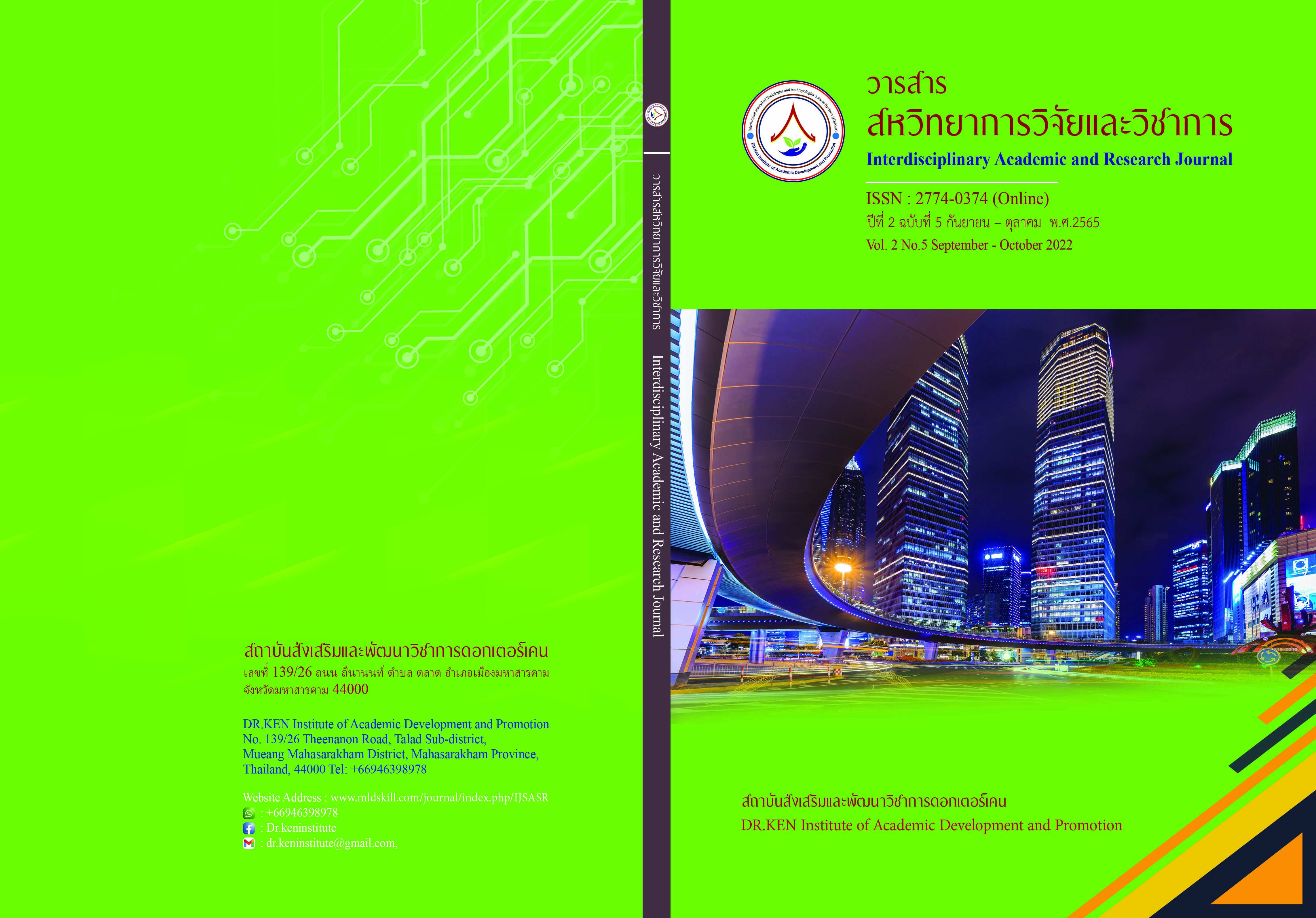RM Academic Management Model based on The Quality Cycle Concept to Enhance Educational Achievement at the School Level, Ruammitwittaya School, Nong Khai Primary Educational Service Area Office 1
DOI:
https://doi.org/10.14456/iarj.2022.93Keywords:
Academic Management Model; , Educational Achievement; , RM ModelAbstract
Systematic and efficient academic management by using the quality cycle concept as a strategy for implementation results in higher student achievement, which is the achievement of students in knowledge, comprehension, skill and intelligence. In this research the objectives were 1) to study the basic information, problem conditions and the need to develop a model of academic administration to enhance educational achievement at the educational institution level, 2) to develop the RM academic management model based on the quality cycle concept to enhance educational achievement at the school level, 3) to experiment with the RM academic management model based on the quality cycle concept to enhance educational achievement at the school level, and 4) to assess the RM academic management model based on the quality cycle concept to enhance educational achievement at the school level. The sample group used in the research consisted of 179 people, including 1 school administrator, 8 school committees, 14 teachers, 78 students, and 78 students' parents in the 2020 academic year. The research instruments were 1) a questionnaire on the condition of problems and the need to develop a model of academic administration to enhance educational achievement at the school level, 2) the RM academic management model based on The quality cycle concept to enhance educational achievement at the school level, 3) a questionnaire on the RM academic management model based on the quality cycle concept to enhance educational achievement at the school level, and 4) assessment form to certify the RM academic management model based on the quality cycle concept to enhance educational achievement at the school level. The statistics used to analyze the data were mean and standard deviation. The results of the research found that; (1) In terms of basic information, it was found that the results of the National Test (NT) of grade 3 students had lower scores than the standard in both arithmetic and language. The results of the Ordinary National Educational Test (O-NET), Thai language, science, math and English subjects of Grade 6 students were lower than the standard. Regarding the condition of the problem, it was found that there were problems in academic administration, budgeting and action research, and there is a need to develop a model of academic administration to enhance educational achievement at the school level to solve teaching problems in order for teaching to be more effective. (2) The RM academic management model based on the quality cycle concept to enhance educational achievement at the school level consists of 4 components; Dimension 1: Quality Teacher and Director, Dimension 2: Quality Classroom, Dimension 3: Quality Student, and Dimension 4: Quality School, and apply the PDCA quality cycle as a guideline for operation. (3) The results of the experiment using the RM academic management model based on the quality cycle concept to enhance educational achievement at the school level found that 1) The results of the National Test (NT) of grade 3 students showed that the math aspect was 90.50% higher, while the language was 96.62% higher, and 2) The results of the Ordinary National Educational Test (O-NET) of Grade 6 students showed that Thai language subjects had a higher score of 53.62%, mathematics subjects had a higher score of 36.20%, science subjects had a higher score of 33.68%, and English subject had a higher score of 34.31%. And (4) Assessment results certify the RM academic management model based on the quality cycle concept to enhance educational achievement at the school level overall averaged 4.37, at a high level. When considering each aspect, it was found that the accuracy aspect had the highest average, followed by feasibility, helpfulness and suitability respectively.
References
กระทรวงศึกษาธิการ. (2557). นโยบายสำนักงานคณะกรรมการการศึกษขั้นพื้นฐาน ปีงบประมาณ 2558.กรุงเทพฯ : ชุมนุมสหกรณ์การเกษตรแห่งประเทศไทย.
ไกรพันธ์ พูลพันธ์ชู สาธร ทรัพย์รวงทอง และ นันทิยา น้อยจันทร์. (2561). รูปแบบการบริหารงานวิชาการสถานศึกษาต้นแบบพัฒนาสู่ประชาคมอาเซียนของสถานศึกษาขั้นพื้นฐาน. วารสารมหาจุฬาวิชาการ. 5 (พิเศษ), 229.
เจตนา เมืองมูล และ นงคราญ ปัญญาสีห์. (2561). การพัฒนามาตรฐานห้องเรียนคุณภาพระดับประถมศึกษาในโรงเรียนสังกัดสำนักงานเขตพื้นที่การศึกษาประถมศึกษาลำพูน เขต 1. [Online] http://www.ska2.go.th/reis/data/research/25640707_093659_7640.pdf. [30 มิถุนายน 2563]
ชนิดา ยอดสาลี และ กาญจนา บุญส่ง. (2559). ปัจจัยที่ส่งผลต่อผลสัมฤทธิ์ทางการเรียนของนักเรียนในสังกัดสำนักงานเขตพื้นที่การศึกษาประถมศึกษาประจวบคีรีขันธ์ เขต 2. Veridian E-Journal, Silpakorn University. 9 (1), 1217-1218.
ชลธิดา เพชรานรากร, วรกฤต เถื่อนช้าง และ สุพรต บุญอ่อน. (2563). การยกระดับผลสัมฤทธิ์ทางการเรียนระดับชาติขั้นพื้นฐาน (O-NET) โดยใช้วงจรคุณภาพตามแนวพระพุทธศาสนา. บัณฑิตศึกษาปริทรรศน์ วิทยาลัยสงฆ์นครสวรรค์. 8 (2), 271-284.
ญาดา วิวัฒนาทร นิพนธ์ วรรณเวช และ พงษ์ศักดิ์ รวมชมรัตน์. (2562). การพัฒนารูปแบบการบริหารงานวิชาการเพื่อเพิ่มสมรรถนะของผู้เรียนในศตวรรษที่ 21 ของสำนักงานส่งเสริมการศึกษานอกระบบและการศึกษาตามอัธยาศัย. วารสารครุศาสตร์ปริทรรศน์. 6 (3), 232-234.
ทิวัฒน์ ศรีดำรง แน่งน้อย ย่านวารี และ สมคิด สร้อยน้ำ (2556). การบริหารสถานศึกษาสู่การเป็นโรงเรียนคุณภาพ : การศึกษาทฤษฎีฐานราก. วารสารบริหารการศึกษา มศว. 10 (18), 6-7.
ธนสมพร มะโนรัตน์. (2561). รูปแบบการพัฒนาคุณภาพผู้เรียนด้านผลสัมฤทธิ์ทางการเรียนระดับชาติโรงเรียนบ้านห่อวารี (นิพัทธ์ธรรมาภรณ์อุปถัมภ์) สังกัดสำนักงานเขตพื้นที่การศึกษาประถมศึกษาศรีษะเกษ เขต 2. วารสารมหาวิทยาลัยราชภัฏร้อยเอ็ด. 12 (ฉบับพิเศษ), 134.
ธริศร เทียบปาน นิรันดร์ จุลทรัพย์ และ วันชัย ธรรมสัจการ. (2561). การพัฒนารูปแบบการบริหารงานวิชาการเพื่อยกระดับคุณภาพผู้เรียน โรงเรียนการกุศลของวัดในพระพุทธศาสนาในเขตจังหวัดภาคใต้. วารสารมหาจุฬานาครทรรศน์. 5 (3), 686.
ภาณี สัจจาพันธ์. (2554). รูปแบบการบริหารงานวิชาการแบบมีส่วนร่วมเพื่อพัฒนาคุณภาพผู้เรียนในสถานศึกษาขั้นพื้นฐาน. วารสารวิชาการมหาวิทยาลัยอีสเทิร์นเอเชีย. 2 (1), 95.
ยลพรรษย์ ศิริวัฒน์ และ มัทนา วังถนอมศักดิ์. (2562). ตัวบ่งชี้คุณภาพการศึกษาของโรงเรียนประถมศึกษา.วารสารการบริหารการศึกษา มหาวิทยาลัยศิลปากร. 10 (1), 492-493.
วิจิตรา สอนทะ. (2563). การบริหารคุณภาพในโรงเรียนมัธยมศึกษา. วิทยานิพนธ์ปรัชญาดุษฎีบัณฑิตสาขาวิชาการบริหารการศึกษา บัณฑิตวิทยาลัย มหาวิทยาลัยศิลปากร.
วีรศักดิ์ ตะหน่อง และ พนายุทธ เชยบาล (2562). กลยุทธ์การบริหารโรงเรียนคุณภาพ สังกัดสำนักงานคณะกรรมการการศึกษาขั้นพื้นฐาน. วารสารมหาจุฬานาครทรรศน์. 6 (9), 4536-4538.
วีระ วงศ์สรรค์. (2559). การพัฒนาผลสัมฤทธิ์ทางการเรียนของนักเรียนระดับชั้นประถมศึกษาที่มีผลการเรียนต่ำ. วารสารวิชาการ มหาวิทยาลัยกรุงเทพธนบุรี. 5 (1), 100-101.
ศักดิ์สิทธิ์ ขัตติยาสุวรรณ วิมล จันทร์แก้ว และ พรพนา ศรีสถานนท์. (2564). ผลการทดสอบทางการศึกษาระดับชาติขั้นพื้นฐาน (O-NET) ปีการศึกษา 2562 ของนักเรียนชั้นประถมศึกษาปีที่ 6 ในโรงเรียนสังกัดสำนักงานคณะกรรมการส่งเสริมการศึกษาเอกชนในกรุงเทพมหานคร. วารสารรรัชต์ภาคย์. 15 (39), 262-279.
ศิรดา บุรชาติ. 2561. การยกระดับผลสัมฤทธิ์ทางการเรียน โดยใช้กระบวนการวิจัยเพื่อปฏิรูปการเรียนรู้แบบเน้นผู้เรียนเป็นสำคัญและการติดตามแลกเปลี่ยนเรียนรู้. วารสารมนุษยศาสตร์และสังคมศาสตร์มหาวิทยาลัยราชภัฏสุรินทร์. 20 (1), 62-63.
สำนักงานคณะกรรมการการศึกษาขั้นพื้นฐาน. (2563). นโยบายสำนักงานคณะกรรมการสถานศึกษาขั้นพื้นฐาน พ.ศ. 2563. [Online] http://www.yst2.go.th/web/wp-content/uploads/2019/09/OBEC-policy-2563.pdf [3 มิถุนายน 2563]
อุทัย ไทยกรรณ์ สุขแก้ว คำสอน และ เกรียงศักดิ์ สุวรรณวัจน์. (2562). รูปแบบการบริหารงานวิชาการสำหรับโรงเรียนขยายโอกาสทางการศึกษา. วารสารมนุษยศาสตร์และสังคมศาสตร์ บัณฑิตวิทยาลัย มหาวิทยาลัยราชภัฏพิบูลสงคราม. 13 (1), 100-110.
Downloads
Published
How to Cite
Issue
Section
License
Copyright (c) 2022 เพชรา พิมพ์ศรี

This work is licensed under a Creative Commons Attribution-NonCommercial-NoDerivatives 4.0 International License.
Copyright on any article in the Interdisciplinary Academic and Research Journal is retained by the author(s) under the under the Creative Commons Attribution-NonCommercial-NoDerivatives 4.0 International License. Permission to use text, content, images, etc. of publication. Any user to read, download, copy, distribute, print, search, or link to the full texts of articles, crawl them for indexing, pass them as data to software, or use them for any other lawful purpose. But do not use it for commercial use or with the intent to benefit any business.
















.png)


